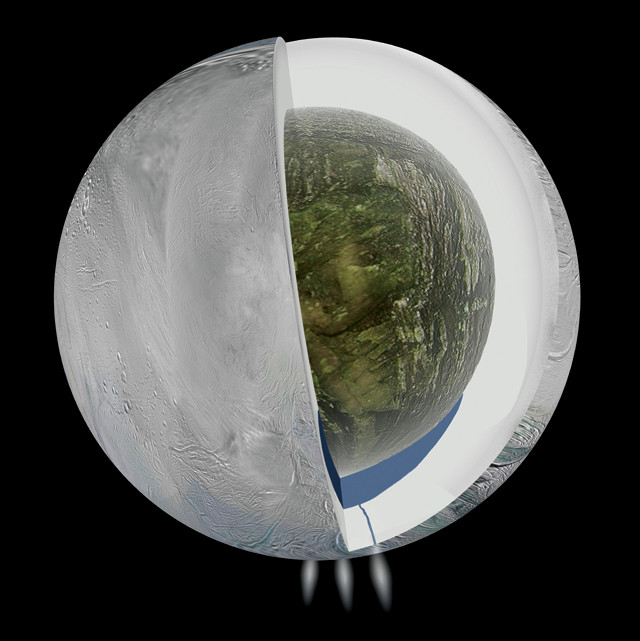
by Mary Caperton Morton Monday, November 2, 2015

A diagram illustrating the possible interior of Saturn's moon Enceladus, including the ocean and plumes in the south polar region. Credit: NASA/JPL-Caltech.
Saturn’s moon Enceladus is home to a vast underground ocean that erupts to the surface at the moon’s south pole in a giant plume of gas, ice and dust. Scientists studying observational data of this plume collected by the Cassini spacecraft, which has been orbiting Saturn since 2004, have recently learned more about the chemistry of Enceladus’ hidden ocean.
In a new study, Christopher Glein of the Carnegie Institution for Science in Washington, D.C., and his colleagues relied on mass spectrometry data of ice grains and gases emitted by Enceladus’ plume to determine that Enceladus’ mysterious ocean has an extremely alkaline pH between 11 and 12, similar to a concentrated solution of ammonia. It also contains sodium chloride, better known as table salt, like Earth’s oceans do, but it boasts a sodium carbonate content higher than the oceans and on par with extreme environments like Mono Lake in California.
The chemical model published by Glein and colleagues in the journal Geochimica et Cosmochimica Acta suggests the highly alkaline ocean may be a result of ocean water circulating through ocean-bottom rocks that are high in magnesium and iron and low in silica. This process, known as serpentinization, produces very alkaline bodies of water on Earth. The process also produces plenty of molecular hydrogen, an essential component of life on Earth.
“This [serpentinization] process is central to the emerging science of astrobiology, because molecular hydrogen can both drive the formation of organic compounds like amino acids that may lead to the origin of life, and serve as food for microbial life such as methane-producing organisms,” Glein said in a statement. “As such, serpentinization provides a link between geological processes and biological processes. The discovery of serpentinization makes Enceladus an even more promising candidate for a separate genesis of life.”
© 2008-2021. All rights reserved. Any copying, redistribution or retransmission of any of the contents of this service without the expressed written permission of the American Geosciences Institute is expressly prohibited. Click here for all copyright requests.